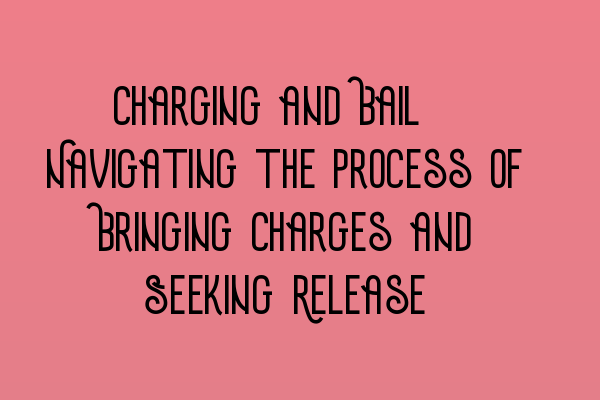Charging and Bail: Navigating the Process of Bringing Charges and Seeking Release
Welcome to SQE Criminal Law & Practice Law UK, where our team of expert solicitors is dedicated to providing you with the highest level of legal advice and support. In this blog post, we will discuss the complex process of charging and bail in criminal cases.
Understanding the Charging Process
When a crime has been committed, it is the responsibility of the police to investigate the incident and gather evidence. Once they have gathered sufficient evidence, they may decide to bring charges against the alleged perpetrator. Our solicitors are well-versed in the intricacies of this process and can guide you through every step.
It is important to note that the decision to bring charges lies with the Crown Prosecution Service (CPS), not the police. The CPS reviews the evidence presented by the police and determines whether there is enough evidence to prosecute. If they decide to proceed, they will issue a charging document outlining the charges.
At SQE Criminal Law & Practice Law UK, we have extensive experience in handling a wide range of criminal charges. Whether you are facing charges for assault, theft, or fraud, our expert solicitors will provide you with the necessary support and representation to navigate the legal process.
Seeking Bail: Your Options
After being charged with a criminal offense, you may be taken into custody. However, in some cases, you may be eligible for bail. Bail is the temporary release of a defendant pending their trial. It allows the defendant to remain in the community until their trial date.
There are several factors that a court considers when deciding whether to grant bail. These include the seriousness of the offense, the defendant’s criminal history, and the likelihood of the defendant fleeing or interfering with the case. Our solicitors have a deep understanding of the bail process and can help present a strong case to secure your release.
If you are granted bail, there may be specific conditions that you must adhere to. These conditions could include regularly reporting to a police station, surrendering your passport, or abstaining from certain activities. Our solicitors will ensure that you fully understand these conditions and help you comply with them.
Legal Support You Can Trust
At SQE Criminal Law & Practice Law UK, we understand the stress and uncertainty that can arise when facing criminal charges. Our team of experienced solicitors is dedicated to providing you with the highest level of legal support and representation.
Whether you require assistance with charging and bail, navigating the criminal justice system, or preparing for trial, our solicitors are here to help. We have a proven track record of success in defending our clients’ rights and securing favorable outcomes.
To learn more about the solicitors qualifying examination format, LLC formation, business regulations in the UK, preparing for the SQE exam, or SQE workshops and webinars, we invite you to explore our related articles:
- Demystifying the Solicitors Qualifying Examination Format
- LLC Formation Made Simple: Step-by-Step Guide for UK Entrepreneurs
- Business Regulations in the UK: A Comprehensive Overview
- Preparing for the SQE Exam: Strategies and Resources for Success
- SQE Workshops and Webinars: Accelerate Your Exam Preparation
For expert legal advice and representation, contact SQE Criminal Law & Practice Law UK today. Our solicitors are ready to fight for your rights and ensure that you receive a fair and just outcome.
